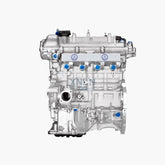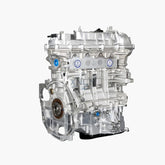1. The structure and working principle of automobile engine
Whether it is a gasoline engine or a diesel engine, its overall structure is similar because of its similar working principles. Both include the crank connecting rod mechanism, which is the basis of engine assembly, and the valve mechanism, which ensures timely ventilation of the cylinder. They also include four systems of supply, cooling, lubrication and starting, but gasoline engines have more ignition systems than diesel engines. . Almost all cars today use a reciprocating piston internal combustion engine. We take a four-stroke gasoline engine as an example to introduce the working principle of a gasoline engine: the engine first mixes air and gasoline into a mixture of a certain proportion, and the mixture is sucked into the cylinder and then compressed. Ignition and combustion generate heat energy, and the piston is subjected to high temperature and high pressure gas for reciprocating linear motion, so that the heat energy is converted into mechanical energy and output through the connecting rod, crankshaft flywheel mechanism, and the car is driven by this.
2. Common fault causes and maintenance of automobile engine
(1) Common causes of automobile engine failures
There will be some small faults in the car engine, which are caused by not paying attention to maintenance and maintenance.
The reasons are as follows:
The first is extended maintenance. This is the most common reason, delaying the oil change or cleaning of the parts will cause damage to the engine parts;
The second is the poor filter element. The filter element is used to filter impurities in the oil or air, which is prone to blockage, so that the impurities in the oil and air will enter the engine interior, causing the interior to fail due to excessive pollution;
Again, the system is bad. The fuel system is poorly maintained and the system is not regularly cleaned with a fuel system cleaner. Paying attention to the lubrication system and not paying enough attention to the cooling system; there are also reasons such as failure to clean the intake pipe in time, too much sludge in the crankcase, rust and scaling in the water tank, etc., which often easily lead to engine failure.
(2) Simple maintenance of automobile engine
By analyzing and summarizing the common failure causes of automobile engines, it is possible to "prescribe the right medicine" and take specific maintenance measures for specific failure causes:
First of all, check the liquid level of the antifreeze of the car to see if the liquid level is appropriate and whether it is in the upper middle position of the bottom line and the top line;
secondly, check and replace the oil and filter regularly, and check the oil level frequently Location, color, regular oil changes. Regularly clean the filter element to ensure the smoothness of the filter element;
in addition, pay attention to the inspection and cleaning of the radiator and the air intake to ensure that the radiator is not stuck by debris and the air intake is unobstructed;
there are some sporadic daily routines.
After maintenance, observe whether the exposed rubber hoses and wires in the engine compartment are aging, chapped or open, and check whether the screws of the parts in the engine compartment of the car are loose.
3. Maintenance of car engine
Regular maintenance of the car can prolong the service life of the car. The engine is the heart of the car, and the focus of car maintenance is on the maintenance of the engine.
(1) Contents that are easily overlooked in car engine maintenance
The first is engine wear. This is a problem that is extremely easy to be ignored. If the engine is stopped for more than 6 hours and restarted, it is called a cold start. This moment will cause dry wear and damage to the engine;
The second is the phenomenon of oil loss. Some drivers and friends think that the oil has not yet been replaced, so they do not pay attention to whether the oil is in deficit or not, but the oil will enter the combustion chamber through the gap between the combustion chamber and the cylinder, causing the phenomenon of oil burning. If it is not handled in time, it will lead to The engine is running low on oil. There is the aging of the oil seal ring. The oil will slowly leak out due to the aging of the oil seal ring. At this time, it is necessary to add a certain amount of repairing agent when changing the oil. If the situation cannot be alleviated, disassemble the engine for complete repair.
(2) Matters needing attention in car engine maintenance
The maintenance and use of the engine run-in period is the most noteworthy issue, which helps to prolong the service life of the engine.
First, don't use idle to warm up the engine. Even the EFI engine with the temperature compensation control system can meet the normal driving of the vehicle in the cold state. But if the EFI engine is warmed up for a long time, the fuel consumption will only increase invisibly.
Second, don't drive at high speeds while driving during the break-in period. The speed limit of 60-150 km/h is generally stipulated in the initial driving stage of a new car. Strictly speaking, it is to ensure that the engine speed is between 2000-4000 rpm.
Third, avoid overloading the engine. New car parts are easily damaged due to full load operation, and the load during the running-in period cannot exceed 75%-80% of the rated load.
Fourth, the original car oil should not be easily replaced during the running-in period. For oil, coolant, battery and electrolyte, it is necessary to check whether the oil is sufficient. Once it is found to be lacking, it must be replenished in time. The oil is generally only changed once when the run-in is about 7500 kilometers.
Don't blindly trust additives. Many people think that additives are "heart-strengthening" tonics, and they will consider adding some fuel additives to the car, thinking that this will be beneficial and harmless to the car. Of course, among these additives, there are also wear agents that are specifically aimed at the engine, but it can only be said to reduce the wear and tear of the engine, and not cure the symptoms. There are also additives that improve the combustion efficiency of the engine through the principle of "secondary intake", thereby achieving the effect of increasing air content and purifying exhaust emissions. But this is not the most fundamental method.
If you want to prolong the life of the engine, you still need to pay attention to the daily regular maintenance of the engine. It is well known that oil is very important for the maintenance and maintenance of the engine. Therefore, in order to keep the engine in good working condition, it is advisable to regularly replace the high-quality oil and the lubricating oil and fluid of other components.
In a word, the engine of the car is being maintained instead of being repaired. Using maintenance instead of repair will not only prolong the service life of the engine, but also reduce the cost of repairs. Therefore, the car should start with daily maintenance, frequent inspection, and frequent cleaning. , pay more attention, do it yourself, and do a good job in the maintenance and maintenance of your car.












